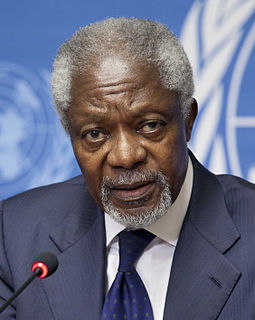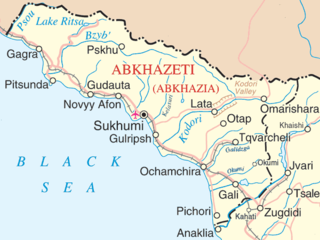| UN Security Council Resolution 1096 | |
|---|---|
 Borjomi in Georgia | |
| Date | 30 January 1997 |
| Meeting no. | 3,735 |
| Code | S/RES/1096 (Document) |
| Subject | The situation in Georgia |
Voting summary | 15 voted for None voted against None abstained |
| Result | Adopted |
| Security Council composition | |
Permanent members | |
Non-permanent members | |
United Nations Security Council resolution 1096, adopted unanimously on 30 January 1997, after reaffirming all resolutions on Georgia, particularly Resolution 1065 (1996), the Council addressed the current situation extended the mandate of the United Nations Observer Mission in Georgia (UNOMIG) until 31 July 1997. [1]
A United Nations Security Council resolution is a UN resolution adopted by the fifteen members of the Security Council; the UN body charged with "primary responsibility for the maintenance of international peace and security".

Georgia, known until 1995 as the Republic of Georgia, is a country in the Caucasus region of Eurasia. Located at the crossroads of Western Asia and Eastern Europe, it is bounded to the west by the Black Sea, to the north by Russia, to the south by Turkey and Armenia, and to the southeast by Azerbaijan. The capital and largest city is Tbilisi. Georgia covers a territory of 69,700 square kilometres (26,911 sq mi), and its 2017 population is about 3.718 million. Georgia is a unitary parliamentary republic, with the government elected through a representative democracy.

United Nations Security Council resolution 1065, adopted unanimously on 12 July 1996, after reaffirming all resolutions on Georgia, particularly 1036 (1996), the Council discussed efforts for a political settlement between Georgia and Abkhazia and extended the mandate of the United Nations Observer Mission in Georgia (UNOMIG) until 31 January 1997.
Contents
The Security Council remained concerned that Georgia and Abkhazia had not resolved the conflict, particularly due to the position taken by the Abkhaz side. Noting the opening of the Human Rights Office in Abkhazia (established in Resolution 1077 (1996), respect for human rights was urged. Both sides had violated the Agreement on a Cease-fire and Separation of Forces signed in Moscow in 1994, and there were armed groups operating south of the Inguri River and beyond the control of the Government of Georgia. Meanwhile, the situation in Gali region continued to deteriorate. The Commonwealth of Independent States (CIS) peacekeeping force, also operating in the country, was expanded and its mandate extended until 31 January 1997.

Abkhazia is a self-declared sovereign state in the South Caucasus on the eastern coast of the Black Sea, south of the Greater Caucasus mountains in northwestern Georgia. It covers 8,660 square kilometres (3,340 sq mi) and has a population of around 240,000. Its capital is Sukhumi. It is called Аԥсны́ [apʰsˈnɨ] in Abkhazian, აფხაზეთი [ɑpʰxɑzɛtʰi] in Georgian, and Абха́зия [ɐˈpxazʲɪjə] in Russian.

United Nations Security Council resolution 1077, adopted on 22 October 1996, after reaffirming all resolutions 937 (1994), 1036 (1996) and 1065 (1996) on Georgia, the Council established a Human Rights Office in Sukhumi, Georgia as part of the United Nations Observer Mission in Georgia (UNOMIG).
The Agreement on a Cease-fire and Separation of Forces was signed by parties to the Georgian-Abkhazian conflict in Moscow on 14 May 1994. Also known as the 1994 Moscow Agreement, it was witnessed by United Nations, Russian Federation and Conference on Security and Cooperation in Europe representatives. The agreement was recognised in United Nations Security Council Resolution 934.
The situation in Georgia was in deadlock and there was no comprehensive settlement of the conflict, while the unacceptability of the Abkhaz position and the 1996 parliamentary election was underlined. In this regard, the intention of the Secretary-General Kofi Annan to strengthen the role of the United Nations in the peace process was welcomed. Both parties were called upon to achieve progress in negotiations and the resumption of high-level talks between both sides was welcomed by the Security Council.

Kofi Atta Annan was a Ghanaian diplomat who served as the seventh Secretary-General of the United Nations from January 1997 to December 2006. Annan and the UN were the co-recipients of the 2001 Nobel Peace Prize. He was the founder and chairman of the Kofi Annan Foundation, as well as chairman of The Elders, an international organization founded by Nelson Mandela.
The resolution then addressed the situation affecting refugees returning to Abkhazia. Continued obstructions of this process and attempts to link it to the political status of Abkhazia were condemned along with demographic changes resulting from the conflict, and the right of all refugees and displaced persons to return was reaffirmed. Furthermore, the Security Council condemned all the ethnic violence and the laying of land mines and asked both parties to guarantee the safety and freedom of movement of UNOMIG, the CIS peacekeeping forces and international humanitarian organisations.
A refugee, generally speaking, is a displaced person who has been forced to cross national boundaries and who cannot return home safely. Such a person may be called an asylum seeker until granted refugee status by the contracting state or the UNHCR if they formally make a claim for asylum. The lead international agency coordinating refugee protection is the United Nations Office of the United Nations High Commissioner for Refugees (UNHCR). The United Nations have a second Office for refugees, the UNRWA, which is solely responsible for supporting the large majority of Palestinian refugees.
This article is about the demographic features of the population of Abkhazia, including population density, ethnicity, education level, health, socioeconomic status, religious affiliations and other aspects of the population.

A land mine is an explosive device concealed under or on the ground and designed to destroy or disable enemy targets, ranging from combatants to vehicles and tanks, as they pass over or near it. Such a device is typically detonated automatically by way of pressure when a target steps on it or drives over it, although other detonation mechanisms are also sometimes used. A land mine may cause damage by direct blast effect, by fragments that are thrown by the blast, or by both.
Finally, the Secretary-General was requested to report to the Council three months after the adoption of Resolution 1096 on the situation in Abkhazia and the operations of UNOMIG, including a review of its future.












